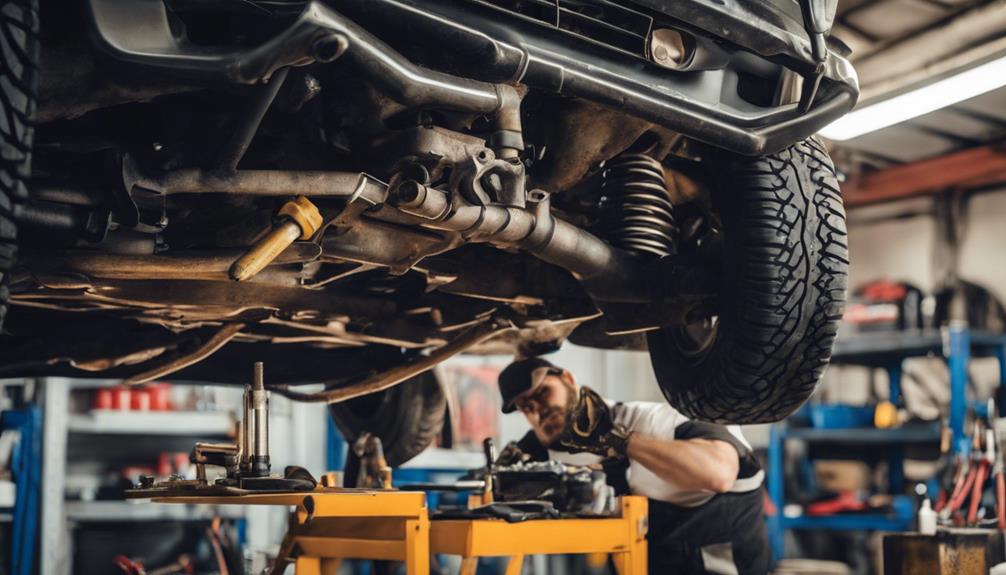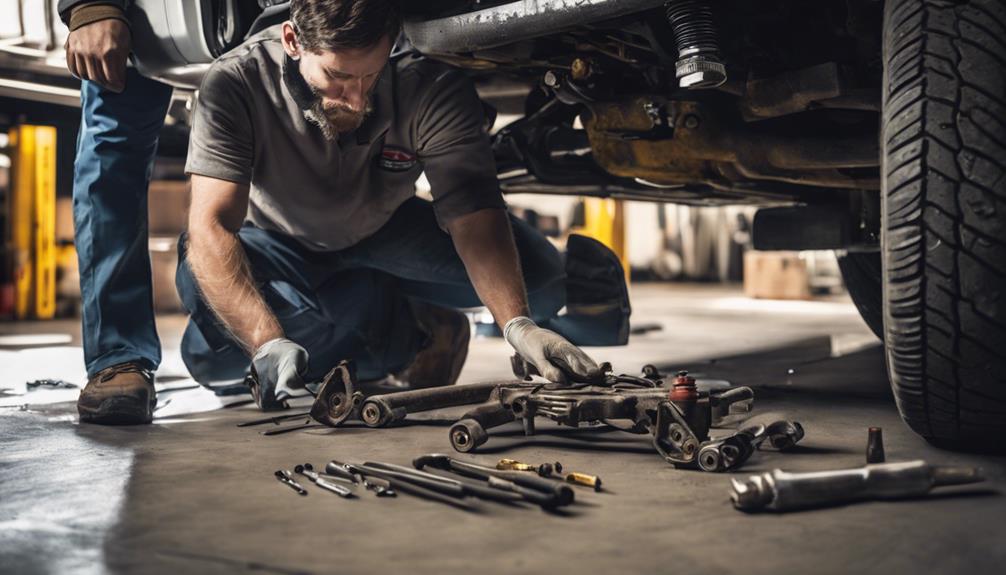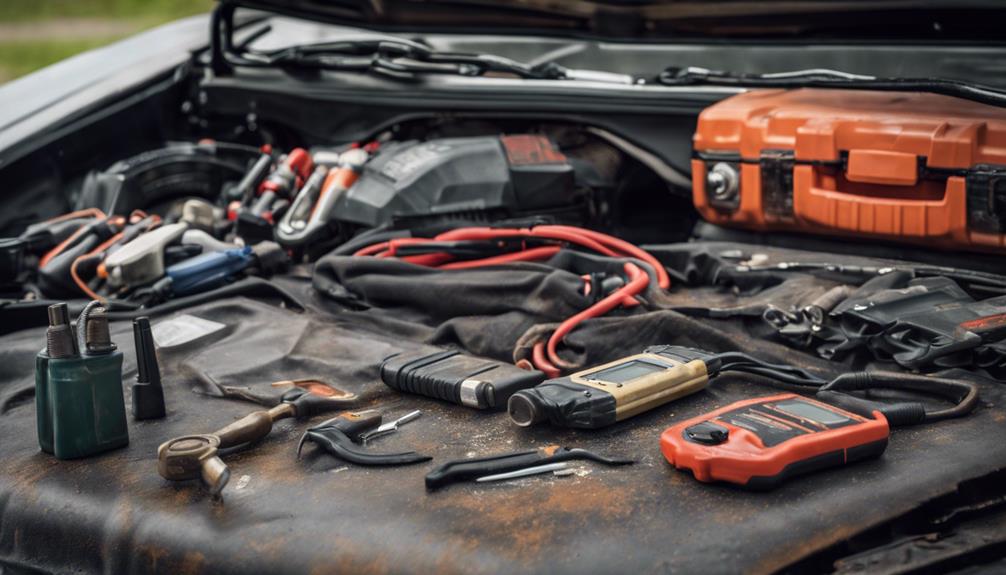Imagine you're out on a rugged trail when your 4×4 suddenly starts making strange noises, cutting your adventure short. Regular maintenance can help prevent such frustrating scenarios, ensuring your vehicle remains reliable when you need it most. From oil changes to undercarriage inspections, each aspect plays a crucial role in your 4×4's performance and longevity. But what specific maintenance tasks should you prioritize to keep your vehicle in top shape? Understanding these can make all the difference in your off-road experiences.
Key Takeaways
- Regular oil changes are crucial for engine protection and optimal performance in 4×4 vehicles.
- Inspect tires for wear and maintain proper inflation to enhance fuel efficiency and handling.
- Perform routine checks on the suspension system to ensure stability and improve off-road capabilities.
- Keep an eye on fluid levels and replace filters regularly to extend the lifespan of your vehicle's drivetrain.
Importance of Regular Oil Changes
Regular oil changes are necessary to keeping your 4×4 running smoothly and ensuring its engine lasts longer. Fresh oil plays a key role in lubricating and protecting engine components, reducing friction and wear significantly. By adhering to the recommended oil change intervals, you can enhance the efficient operation of your vehicle, which is important for both everyday driving and off-road adventures.
When you take your 4×4 off the beaten path, the engine faces additional challenges. Dirt, debris, and other contaminants can quickly compromise your oil's effectiveness, making regular oil changes even more important. Failing to replace old, contaminated oil can lead to serious engine damage, decreased fuel efficiency, and ultimately, costly repairs that could've been avoided.
Tire and Wheel Inspections
Examining your tires regularly is crucial for maintaining their condition and ensuring peak performance. You should also check the alignment and monitor tire pressure to prevent uneven wear and improve handling. These steps are crucial for both safety and performance, especially when tackling challenging terrains.
Inspect Tire Condition
To guarantee safe off-road driving, it's crucial to regularly check your tires for cuts, bulges, and signs of excessive wear. Proper tire maintenance is critical for your 4×4 vehicle's performance and longevity. Neglecting this essential aspect can lead to dangerous situations on challenging terrains, so make it a habit to inspect your tires frequently.
Here are some key points to keep in mind during your tire inspections:
- Tire Inflation Levels: Make sure your tires are properly inflated for peak traction and handling.
- Surface Integrity: Look for any visible damage like cuts or punctures that could compromise tire safety.
- Tread Depth: Measure tread depth to ensure sufficient grip; worn tires can lead to loss of control.
Check Wheel Alignment
Ensuring your 4×4's wheel alignment is spot-on is necessary for peak tire performance and handling, especially after traversing rough terrains. Regular inspections of your wheel alignment can help you maintain optimum driving conditions and enhance your vehicle's overall safety. Misaligned wheels can lead to uneven tire wear, reduced fuel efficiency, and compromised vehicle stability, which can be detrimental during off-road adventures.
It's essential to inspect your alignment after hitting obstacles or tackling challenging trails. When you neglect this aspect, you risk premature tire replacement and costly suspension repairs. By addressing alignment issues promptly, you'll not only enhance driving performance and steering response but also prolong the life of your tires.
Consider scheduling regular inspections as part of your maintenance routine. This proactive approach ensures that your 4×4 remains in peak condition, allowing you to enjoy every journey with confidence. Remember, keeping your wheel alignment in check is a crucial step in ensuring you and your vehicle are ready for whatever the road—or off-road—throws your way. Prioritize this aspect of your maintenance, and you'll cultivate a safer, more reliable driving experience.
Monitor Tire Pressure
Monitoring tire pressure regularly is important for maintaining peak performance and safety in your 4×4, as improper inflation can lead to uneven wear and reduced traction on rugged terrains. Keeping an eye on your tire pressure not only enhances your driving experience but also secures your safety during off-road adventures.
Here are some key points to remember when checking tire pressure:
- Proper Inflation: Always maintain the manufacturer-recommended tire pressure to prevent uneven wear.
- Improved Traction: Correct tire pressure enhances traction and handling, essential for handling challenging terrains.
- Damage Inspection: Regularly inspect your tires for damage or bulges, as low tire pressure may lead to blowouts.
Suspension System Maintenance

Maintaining your 4×4's suspension system is essential for ensuring a safe and comfortable ride. Regular inspections can help you identify signs of worn components, such as leaks or unusual noises, before they lead to more significant issues. By addressing these problems promptly, you can enhance your vehicle's performance and prevent costly repairs down the line.
Importance of Regular Inspections
Regular inspections of your suspension system are essential for ensuring a comfortable and safe ride across diverse terrains. By incorporating routine maintenance, you can enhance your vehicle's performance and longevity. Regular checks help identify issues before they escalate, ensuring that your 4×4 remains reliable and responsive.
Consider the following key points about the significance of routine inspections:
- Prevent Premature Wear: Regularly checking components such as shocks, struts, and springs can prevent costly replacements down the line.
- Enhanced Handling and Stability: Replacing worn suspension parts promptly improves overall vehicle handling, making your rides smoother and safer.
- Cost Savings: Monitoring your suspension system helps avoid major repairs, saving you money and time in the long run.
Signs of Worn Components
Identifying signs of worn suspension components is essential for maintaining your vehicle's performance and safety on various terrains. Start by observing how your vehicle handles. If you notice excessive bouncing, uneven tire wear, or a rough ride, it's time to investigate further. Listen for unusual noises, like clunking or squeaking, particularly when you go over bumps—these sounds can indicate suspension issues.
Next, inspect your suspension system for any visible damage, including rust or corrosion. Such deterioration can compromise performance and longevity. Don't forget to check for fluid leaks around shock absorbers or struts; these leaks often suggest failing components.
Worn suspension parts can lead to poor handling and decreased stability, which not only affects your driving experience but also increases wear on other vehicle components. Regularly checking your suspension system can save you from costly repairs and guarantee a safe ride. By staying vigilant and addressing signs of wear early, you'll maintain the reliability of your 4×4 and enjoy the adventure it brings. Your commitment to these checks fosters a strong sense of belonging within the 4×4 community, where safety and performance are of utmost importance.
Brake System Care
Proper brake system care is essential to guarantee that your 4×4 performs safely and effectively on both paved roads and challenging terrains. A well-maintained brake system not only enhances your vehicle's responsiveness but also provides peace of mind during your adventures. Start by regularly checking the brake pads, discs, and brake fluid levels. This routine inspection helps catch any issues before they escalate.
- Inspect for signs of wear, such as squeaking or reduced stopping power.
- Replace worn brake components promptly to prevent brake failure on tough trails.
- Make sure your brake fluid is clean and at the appropriate level to ensure peak performance.
Fluid Level Monitoring
Maintaining the brake system sets the stage for effective fluid level monitoring, which is essential for ensuring your 4×4 operates reliably across various conditions. Regularly checking your fluid levels, including oil, wiper fluid, transmission fluid, brake fluid, power steering fluid, and coolant, is necessary for optimal vehicle performance. Each of these fluids plays a crucial role in your 4×4's functionality, and keeping them at appropriate levels helps prevent overheating, corrosion, and component damage.
Make it a habit to inspect for leaks, low levels, or contamination in your fluids. Identifying these issues early can save you from costly repairs down the line and safeguard the reliability of your vehicle. Fluid level monitoring is an important part of preventive maintenance that extends the lifespan of your drivetrain and other essential components.
Neglecting these checks can lead to significant problems, compromising your 4×4's performance and safety. By staying proactive and attentive to fluid levels, you're not just maintaining your vehicle; you're ensuring that you and your fellow off-road enthusiasts can rely on your 4×4, no matter where the adventure takes you.
Air Filter Maintenance
Maintaining a clean air filter is vital for your 4×4's engine performance, especially in demanding off-road conditions. Regular checks and timely replacements can prevent dirt and debris from harming the engine and guarantee peak airflow for better combustion. Understanding when to replace your air filter can improve fuel efficiency and prolong the life of your vehicle.
Importance of Clean Filters
Clean air filters play a critical role in maintaining your 4×4 vehicle runs efficiently, especially after tackling challenging off-road terrains where dirt and debris can quickly accumulate. A clogged air filter restricts airflow to the engine, which can lead to reduced performance and increased wear.
Regularly checking and maintaining the air filter is essential. Here's why clean air filters should be a priority for every 4×4 owner:
- Optimal Engine Performance: A clean air filter ensures your engine receives the proper amount of air for combustion, enhancing performance.
- Fuel Efficiency: Dirty filters can decrease fuel efficiency, costing you more at the pump during your off-road adventures.
- Engine Longevity: Regular maintenance of your air filter helps avoid unnecessary engine damage and prolongs its lifespan.
Replacement Timing Guidelines
Knowing when to replace your air filter is essential for ensuring your 4×4 operates at peak efficiency, especially after extensive off-road use. Generally, you should replace your air filter every 12,000 to 15,000 miles. However, if you frequently tackle dusty trails or rugged terrains, consider changing it more often. Off-road driving exposes your vehicle to higher levels of dust and debris, which can clog the filter and restrict airflow.
A clogged air filter can greatly reduce engine efficiency, leading to decreased fuel economy and power output. This is where your engine relies on a smooth flow of air to mix with fuel, ensuring best combustion. If the air filter gets dirty, it disrupts this fluid dynamic, affecting overall performance.
For best practices, always consult your owner's manual for specific guidelines tailored to your driving conditions. Regular air filter maintenance not only enhances your 4×4's performance but also helps prevent engine damage, extending the lifespan of your vehicle. By staying on top of air filter replacements, you're investing in reliability and efficiency, ensuring your adventures continue without any issues.
Undercarriage Inspections

Conducting regular undercarriage inspections is vital for identifying potential damage and preventing expensive repairs in your 4×4 vehicle. The undercarriage is often exposed to harsh conditions, making it essential to check for any signs of wear or damage regularly. By doing this, you can guarantee your vehicle remains reliable and performs at its best.
Here are key aspects to focus on during your inspections:
- Leaks: Look for any fluid leaks that may indicate failing seals or gaskets.
- Rust: Inspect for early signs of rust, especially in areas prone to moisture exposure.
- Debris: After off-road trips, check for accumulated mud, sand, and debris that could compromise the undercarriage.
Cooling System Upkeep
Maintaining the undercarriage is important, but equally essential is ensuring your cooling system is in top shape to prevent engine damage in your 4×4. Regular checks of the cooling system are necessary, especially for those who love tackling off-road challenges. Start by inspecting the radiator for any signs of wear or leaks. Hoses should also be examined; cracks or soft spots can lead to unexpected failures.
Don't overlook the coolant level and condition. Old or contaminated coolant can compromise your engine's ability to regulate temperature, leading to overheating—one of the most common issues faced by off-road vehicles.
In challenging terrains and extreme conditions, your cooling system works harder, making upkeep even more crucial. By ensuring all components are functioning optimally, you not only prevent overheating but also extend the life of your engine.
Battery Maintenance Tips

Regular battery maintenance is essential for guaranteeing your 4×4 starts reliably, especially in challenging environments. Neglecting your battery can lead to unexpected failures, particularly when you venture into extreme conditions. By following these tips, you can improve your battery's lifespan and performance:
- Clean and secure battery terminals regularly to avoid corrosion and ensure peak electrical contact.
- Check the battery charge level frequently, especially during temperature extremes or after rough off-roading.
- Consider replacing the battery every three years or sooner if you notice signs of weakness, like slow engine cranking.
Keeping Your Vehicle Clean
Keeping your 4×4 clean is just as vital as battery maintenance, especially after off-road excursions where mud and debris can lead to hidden issues and long-term damage. Regular cleaning isn't just about aesthetics; it's essential for preserving the integrity and longevity of your vehicle. Dirt and grime can accumulate in places you can't see, potentially concealing maintenance items that require attention.
Pay special attention to the undercarriage, as this area is prone to corrosion. A thorough wash here can help prevent rust buildup, which is essential for your 4×4's health. After an adventure, use a pressure washer to dislodge stuck dirt and make sure all parts are clean.
Incorporating a cleaning routine into your maintenance schedule can greatly reduce future repair costs. Aim to clean your vehicle after every off-road trip, and consider using specialized cleaning products designed for 4×4 vehicles. By prioritizing cleanliness, you not only enhance your vehicle's performance but also foster a sense of community and pride among fellow off-road enthusiasts. Remember, a clean 4×4 is a happy 4×4.
Frequently Asked Questions
What Maintenance Does a 4×4 Need?
Your 4×4 needs regular oil changes, including differential and transfer case oils, along with checking grease fittings and rotating tires. This maintenance guarantees peak performance, prevents wear, and helps you enjoy your off-road adventures safely.
What Is the Most Reliable 4×4 of All Time?
When considering the most reliable 4×4 of all time, you can't overlook the Toyota Land Cruiser. Its unmatched durability, outstanding performance, and legendary off-road capabilities make it a top choice for adventurous enthusiasts like you.
Which 4×4 Has the Least Problems?
When considering which 4×4 has the least problems, the Toyota Landcruiser stands out. Its robust engineering and legendary durability guarantee you're investing in a vehicle that minimizes issues, providing peace of mind on any adventure.
Are 4×4 More Expensive to Maintain?
Yes, 4x4s generally have higher maintenance costs compared to standard vehicles. When considering a cost comparison, remember that their complex systems require specialized care, which can lead to increased expenses over time if not properly maintained.
Conclusion
In the grand symphony of 4×4 maintenance, each task plays an essential note in ensuring your vehicle performs at its peak. By regularly tending to oil changes, tire inspections, and fluid levels, you're not just prolonging its life; you're orchestrating a seamless ride through rugged terrain. Think of it as a well-tuned engine, harmonizing power and safety. With diligent care, your 4×4 will continue to conquer the wild, ready for any adventure that comes its way.
